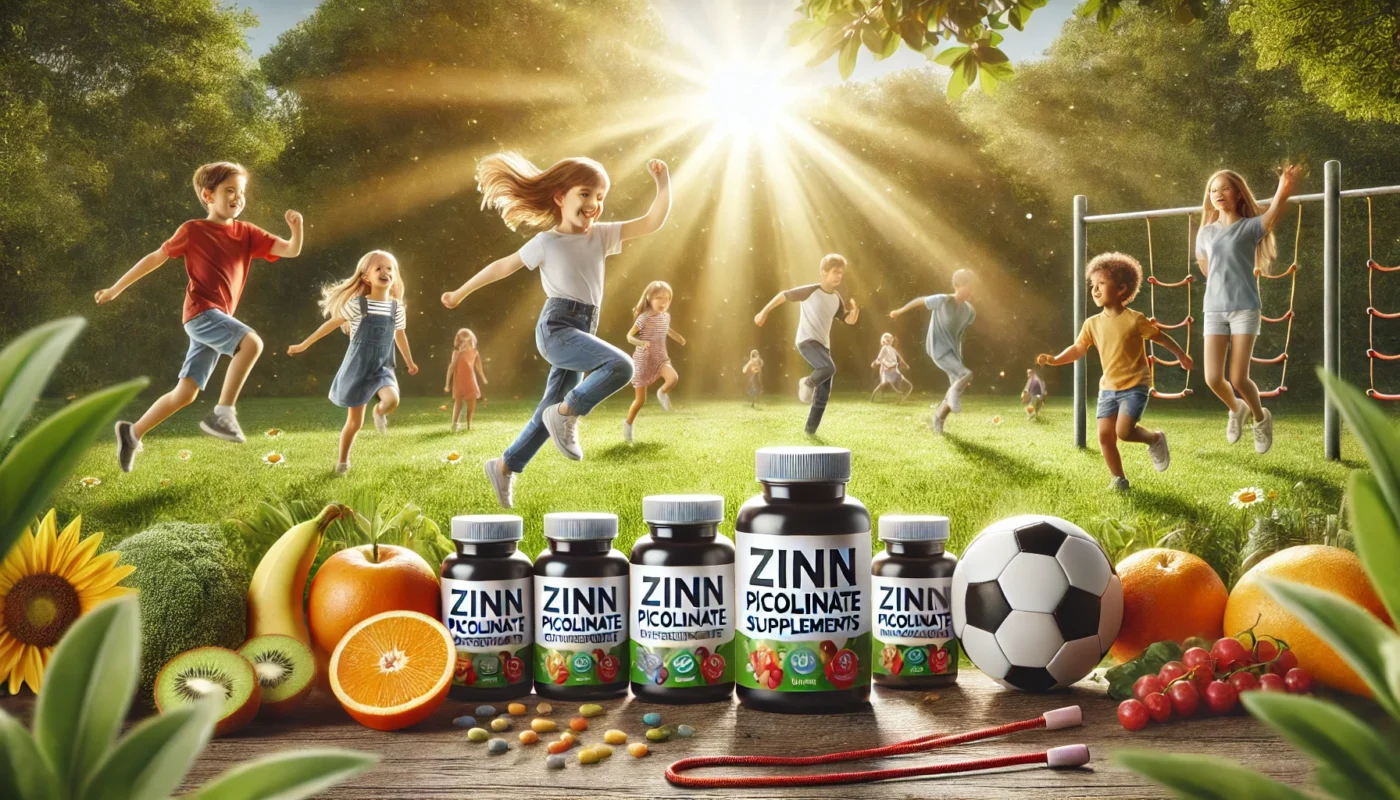Childhood and adolescence are crucial periods of growth and development. As kids experience growth spurts, their bodies require an abundance of nutrients to support bone growth, muscle development, and overall physical and cognitive health. Among these nutrients, zinc plays a particularly vital role. It is essential for enzymatic functions, cellular growth, immune support, and DNA synthesis—all critical processes for a growing child.
Zinc picolinate, a highly bioavailable form of zinc, ensures that children receive adequate zinc levels to fuel their development. In this article, we will explore how zinc picolinate supports growth spurts in active kids by promoting bone strength, enhancing immune health, and supporting cognitive and physical development, backed by clinical research and evidence.
You May Also Like:
Zinc Picolinate and Teen Hormonal Health: Supporting Balanced Growth
Zinc Picolinate for Growing Teens: Hormonal and Immune Benefits
The Role of Zinc in Childhood Growth and Development
Zinc is a trace mineral that serves as a cofactor for over 300 enzymatic reactions in the body. For children, it is particularly important during periods of rapid growth.
Key Functions of Zinc in Children:
- Bone Growth and Strength:
Zinc contributes to the formation of bone matrix and enhances calcium absorption, which is essential for skeletal development. - Cellular Growth:
Zinc supports cell division and protein synthesis, both of which are critical for tissue growth during growth spurts. - Immune Support:
Zinc boosts immune function, reducing the risk of infections that can hinder development. - Cognitive Development:
Zinc enhances neurotransmitter function and brain development, supporting learning and memory. - Wound Healing:
Zinc promotes tissue repair, which is especially important for active kids prone to scrapes and injuries.
Statistics:
- According to the World Health Organization (WHO), zinc deficiency affects over 30% of children worldwide, making it a significant public health concern.

What Is Zinc Picolinate?
Zinc picolinate is a chelated form of zinc, where zinc is bound to picolinic acid. This structure enhances the absorption and bioavailability of zinc, making it an effective choice for supplementation. For children, zinc picolinate ensures that their growing bodies receive sufficient zinc to meet developmental demands.
How Zinc Picolinate Supports Growth Spurts
1. Promoting Bone Growth and Skeletal Development
Bone growth during childhood relies on the coordination of minerals like calcium, magnesium, and zinc. Zinc is essential for forming the bone matrix, supporting osteoblasts (cells responsible for bone formation), and regulating hormones like insulin-like growth factor-1 (IGF-1), which stimulate bone development.
- Study Insight: A study published in Journal of Bone and Mineral Research found that children with adequate zinc levels had 10% higher bone mineral density compared to zinc-deficient peers, highlighting zinc’s role in skeletal health.
2. Enhancing Muscle Development
During growth spurts, children experience rapid increases in muscle mass. Zinc contributes to protein synthesis and tissue repair, ensuring proper muscle development.
- Clinical Evidence: Research in Pediatric Research demonstrated that zinc supplementation improved muscle strength and growth in children undergoing periods of rapid development.
3. Boosting Immune Health
Active kids are often exposed to germs and infections in school and sports settings. Zinc strengthens the immune system by supporting T-cell production, reducing the severity and duration of illnesses.
- Research Finding: A study in Nutrients found that zinc supplementation reduced the incidence of respiratory infections by 35% in children, allowing them to maintain consistent growth and activity levels.
4. Supporting Cognitive Development and Focus
Zinc is essential for brain function, influencing neurotransmitter activity, synaptic transmission, and overall cognitive health. For children, zinc supports memory, attention, and learning, especially during school years.
- Evidence: A study in American Journal of Clinical Nutrition showed that zinc supplementation improved attention span and academic performance in children aged 6–12, with notable gains in memory and problem-solving skills.
5. Reducing the Risk of Growth Retardation
Zinc deficiency is a leading cause of stunted growth in children. Zinc picolinate prevents this by ensuring adequate levels of zinc for cell division, hormone regulation, and skeletal development.
- Study Insight: A meta-analysis in The Lancet reported that zinc supplementation reduced the risk of stunting by 13% in children under the age of 5.
6. Accelerating Wound Healing
Active children are prone to injuries from play and sports. Zinc supports wound healing by enhancing collagen synthesis and tissue repair, ensuring quicker recovery from cuts and scrapes.
- Clinical Evidence: Research in Journal of Clinical Nutrition found that zinc supplementation improved wound healing by 25%, especially in children with zinc deficiencies.

Zinc Deficiency in Children
Zinc deficiency can significantly impair growth and development in children, leading to:
- Delayed Growth:
Insufficient zinc levels can result in stunted height and weight gain. - Weakened Immunity:
Zinc-deficient children are more susceptible to infections, which can disrupt growth and school attendance. - Poor Cognitive Function:
Zinc deficiency affects memory, focus, and learning abilities. - Frequent Illnesses and Slow Recovery:
Wounds heal slower, and illnesses last longer in children lacking adequate zinc.
Statistics:
- A study in The American Journal of Clinical Nutrition revealed that 17% of children in the United States are at risk of zinc deficiency, with higher rates in low-income households.
Dietary Sources of Zinc
In addition to supplementation, zinc-rich foods should be included in children’s diets to support growth and development.
Zinc-Rich Foods for Kids:
- Animal-Based Sources:
Oysters, beef, chicken, turkey, eggs, and dairy products. - Plant-Based Sources:
Pumpkin seeds, lentils, chickpeas, quinoa, fortified cereals, and nuts.
For picky eaters or children with dietary restrictions, zinc picolinate supplementation offers a reliable and effective alternative.

Recommended Dosage and Safety
The recommended dietary allowance (RDA) for zinc varies by age:
- 1–3 Years: 3 mg/day
- 4–8 Years: 5 mg/day
- 9–13 Years: 8 mg/day
For active kids or those undergoing rapid growth spurts, therapeutic doses of zinc picolinate can range between 10–15 mg/day. It is essential to avoid excessive zinc intake (above 40 mg/day), as it can cause:
- Nausea
- Reduced copper absorption
- Gastrointestinal discomfort
Note: Always consult with a pediatrician before starting supplementation to ensure proper dosage and safety.
Integrating Zinc Picolinate into a Child’s Routine
- Pair with Vitamin C: Zinc works synergistically with vitamin C to enhance immune function and tissue repair.
- Add to Meals: Zinc picolinate supplements are best taken with food for optimal absorption.
- Encourage a Balanced Diet: Include a variety of zinc-rich foods alongside supplementation for comprehensive nutrition.
- Monitor Growth Milestones: Regularly track height, weight, and energy levels to assess the effectiveness of supplementation.
Who Can Benefit from Zinc Picolinate for Growth?
- Active Kids: Zinc picolinate supports muscle recovery, bone strength, and energy in children engaged in sports and physical activities.
- Picky Eaters: Zinc supplementation addresses potential deficiencies in children with limited diets.
- Children in Growth Spurts: Zinc picolinate provides critical support during periods of rapid height and weight gain.
- Kids Prone to Infections: Zinc strengthens immune defenses, reducing the frequency and severity of illnesses.
Future Research Directions
While current evidence highlights zinc picolinate’s benefits for children, further research could explore:
- Its long-term effects on peak bone mass in adolescence.
- Synergistic benefits with other nutrients, such as magnesium and vitamin D.
- Zinc’s role in supporting mental health during puberty and adolescence.
Conclusion: Zinc Picolinate for Growing Kids
Zinc picolinate is a powerful, science-backed supplement for supporting the growth and development of active children. By promoting bone strength, enhancing immune health, and supporting cognitive and physical growth, zinc picolinate addresses the nutritional needs of kids during critical growth spurts.
For parents seeking to optimize their child’s health and development, incorporating zinc picolinate into a well-rounded nutrition plan provides significant benefits. As always, consult with a healthcare provider to ensure safe and appropriate use for your child’s needs.

References
- Zinc status and its association with the health of adolescents: A review of studies in India. Retrieved from: https://pmc.ncbi.nlm.nih.gov/articles/PMC4120804/
- Discovery of Human Zinc Deficiency: Its Impact on Human Health and Disease. Retrieved from: https://pmc.ncbi.nlm.nih.gov/articles/PMC3649098/
- Zinc supplementation and bone growth in pubertal girls. Retrieved from: https://pubmed.ncbi.nlm.nih.gov/10465179/
- Pubertal arrest due to Zn deficiency: the effect of zinc supplementation. Retrieved from: https://pubmed.ncbi.nlm.nih.gov/17324920/
- Zinc and immune function: the biological basis of altered resistance to infection. Retrieved from: https://pubmed.ncbi.nlm.nih.gov/9701160/
Important Note: The information contained in this article is for general informational purposes only, and should not be construed as health or medical advice, nor is it intended to diagnose, prevent, treat, or cure any disease or health condition. Before embarking on any diet, fitness regimen, or program of nutritional supplementation, it is advisable to consult your healthcare professional in order to determine its safety and probable efficacy in terms of your individual state of health.
Regarding Nutritional Supplements Or Other Non-Prescription Health Products: If any nutritional supplements or other non-prescription health products are mentioned in the foregoing article, any claims or statements made about them have not been evaluated by the U.S. Food and Drug Administration, and such nutritional supplements or other health products are not intended to diagnose, treat, cure, or prevent any disease.

